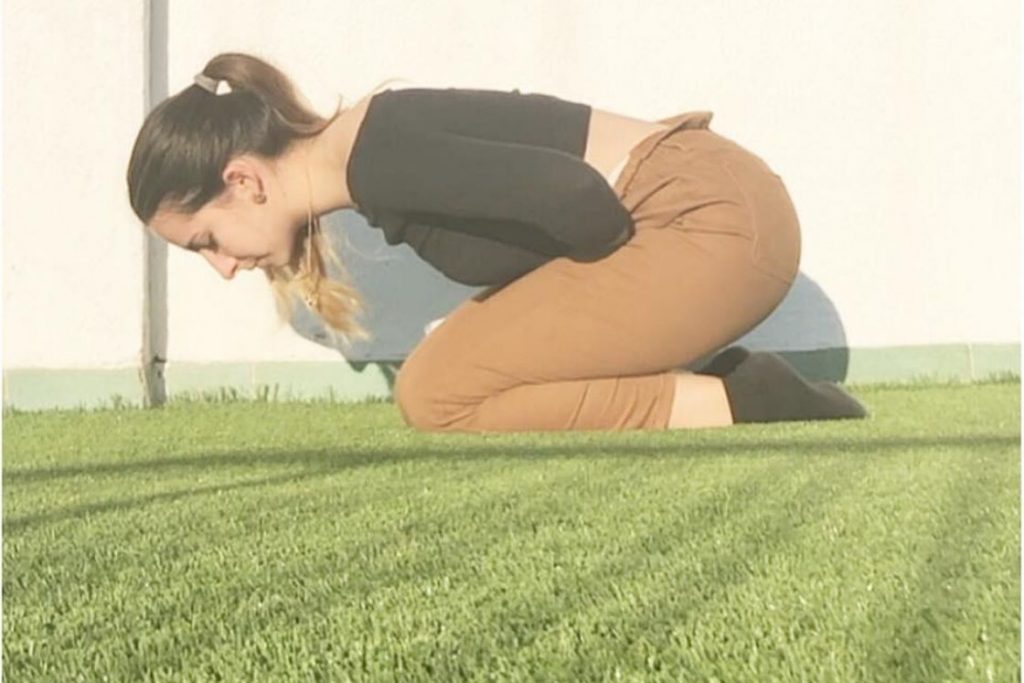
Mandukasana, also referred to as Frog Pose, is a standard hatha yoga posture that tones the stomach, helps digestion and opens the hips. It’s appropriate for newcomers as a result of it makes use of light strain on the belly space and improves flexibility within the knees and thighs. The pose additionally helps scale back stress and brings the thoughts into a peaceful state.
Mandukasana is usually utilized in yoga remedy for digestive points, stress aid and bettering joint mobility. As a result of it really works on the stomach, hips and breath on the identical time, it’s a easy posture with many helpful advantages.
That means
Mandukasana comes from the Sanskrit phrases manduka, which implies frog, and asana, which implies pose. The form of the legs on this posture appears much like a frog sitting on the bottom, so it’s known as Frog Pose. One other yoga pose primarily based on the frog form is Bhekasana.
Practising this pose helps draw vitality inward. As an alternative of letting the thoughts and senses transfer outward, Mandukasana encourages the practitioner to show consideration inside and really feel regular and centred.
The detailed clarification of Mandukasana is given by Vishnudevananda Saraswati in The Full Illustrated E-book of Yoga. This pose, together with its variation Uttana Mandukasana, can be listed among the many 32 helpful asanas within the classical textual content Gheranda Samhita.
Who ought to practise mandukasana
Mandukasana is useful for:
- Folks with weak digestion
- Folks with gasoline, bloating or sluggish bowel motion
- Learners who desire a easy hip-opening posture
- Folks with gentle stress or psychological fatigue
- Practitioners wanting light belly activation
Observe information of mandukasana
Mandukasana could be practised safely by following regular, managed motion. The information under explains learn how to put together the physique and learn how to enter, maintain and launch the pose appropriately.
Preparatory Pose
How you can do mandukasana (step-by-step information)
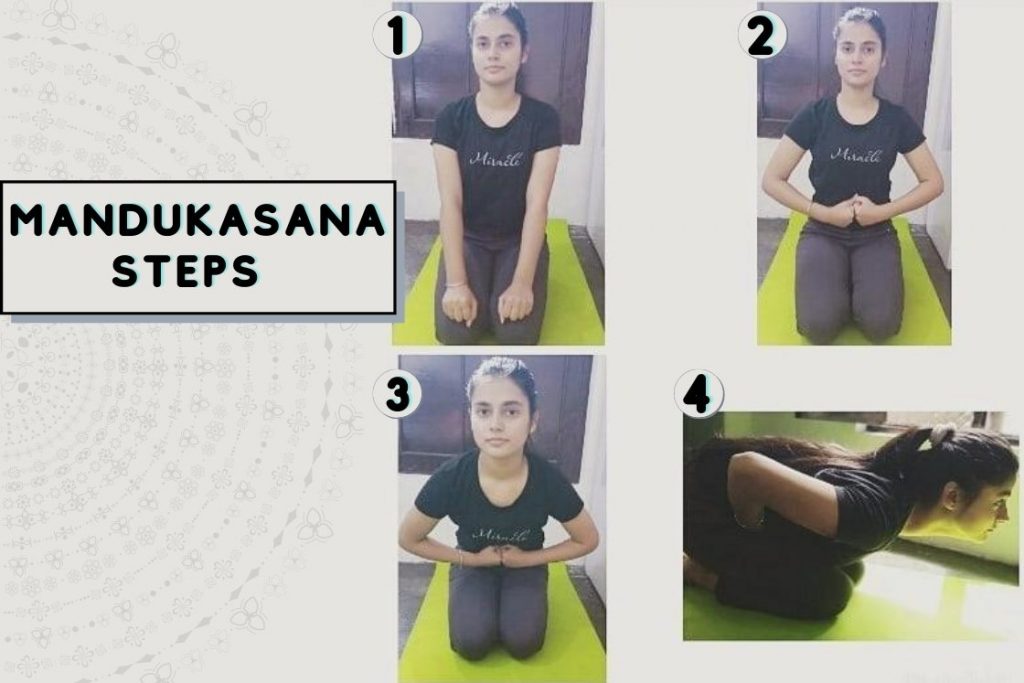
- Sit in Vajrasana along with your toes touching behind you. Preserve the backbone straight and settle the hips on the heels.
- Convey your arms in entrance of the stomach and kind Adi Mudra with each arms.
- Take a deep breath in. As you exhale totally, place your fists on both facet of the navel. Gently draw the navel inward.
- Begin bending ahead slowly. Preserve making use of gentle strain on the stomach along with your fists.
- Look ahead or barely upward to assist preserve the again straight.
- Maintain the ultimate place. Keep right here for thirty to sixty seconds. You might retain the breath out solely if you’re used to it, in any other case breathe slowly and evenly.
How you can launch mandukasana
- To return out of Mandukasana:
- Sit comfortably in Vajrasana and chill out the physique and breath.
- Cut back the strain on the stomach by easing the fists.
- Inhale slowly and raise the torso again to the upright place.
- Place your arms beside the hips.
Mandukasana newcomers ideas
- If you bend ahead, attempt to carry the chest nearer to the thighs. This helps you preserve a superb posture.
- In case you are not aware of breath retention, don’t maintain the breath. Use sluggish, regular respiration as an alternative.
- Transfer slowly whereas coming into and popping out of the pose to keep away from pressure on the knees and decrease again.
How lengthy and the way usually to practise
- Maintain Mandukasana for 20 to 60 seconds.
- Repeat 2 or 3 rounds relying on consolation.
- Greatest time to practise: morning on an empty abdomen or 4 hours after a meal.
Observe up pose
Mandukasana variations
One can deepen the Mandukasana with its widespread practiced variations:
Adho Mukha Mandukasana
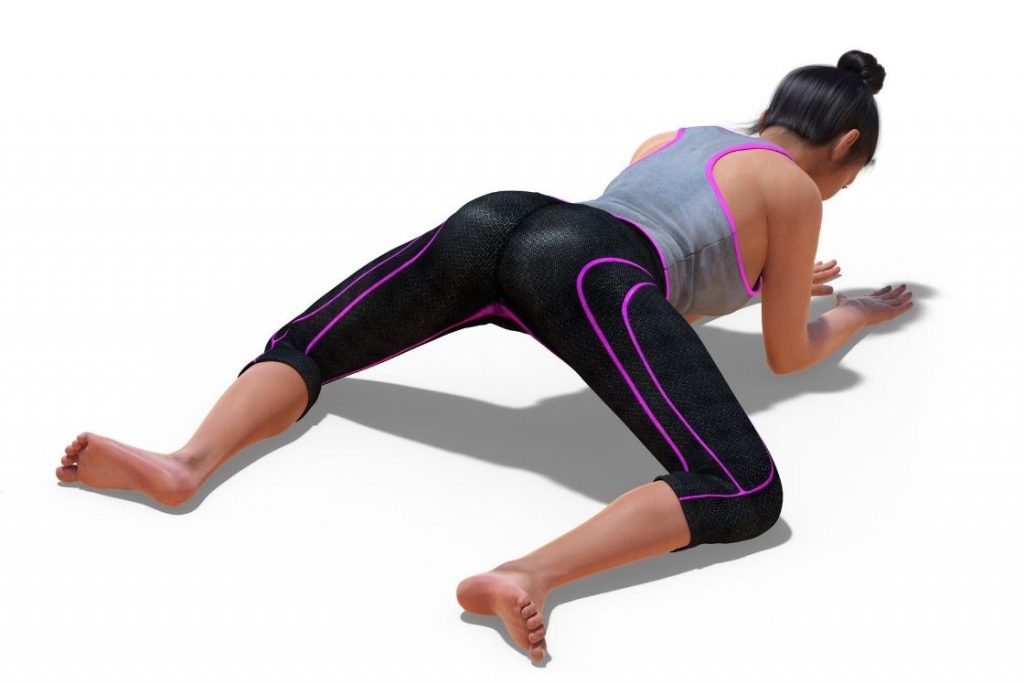
This variation of Mandukasana is essentially the most practiced pose for opening tight hip muscle mass. On this, the pinnacle goes down from the chest degree so it’s known as Adho Mukha Mandukasana i.e. Downward dealing with frog pose.
- Sit in Vajrasana, then come into the tabletop place.
- Now, unfold your knees aside as huge as comfy by sliding via your shin and knees.
- Relaxation your elbow and forearms on the bottom, both place your palms agency on the ground or interlock finger collectively giving the form of a fist hammer.
- Elevate your tailbone, broadened your decrease again, and expertise a deep stretch in thighs and hips. This may can help you attain totally into the posture.
- Maintain the place for few breaths or as per your consolation.
- After it, stroll via the hand or arms ahead whereas decreasing the hips and remainder of the physique to lie flat on the ground and chill out.
2. Uttana Mandukasana
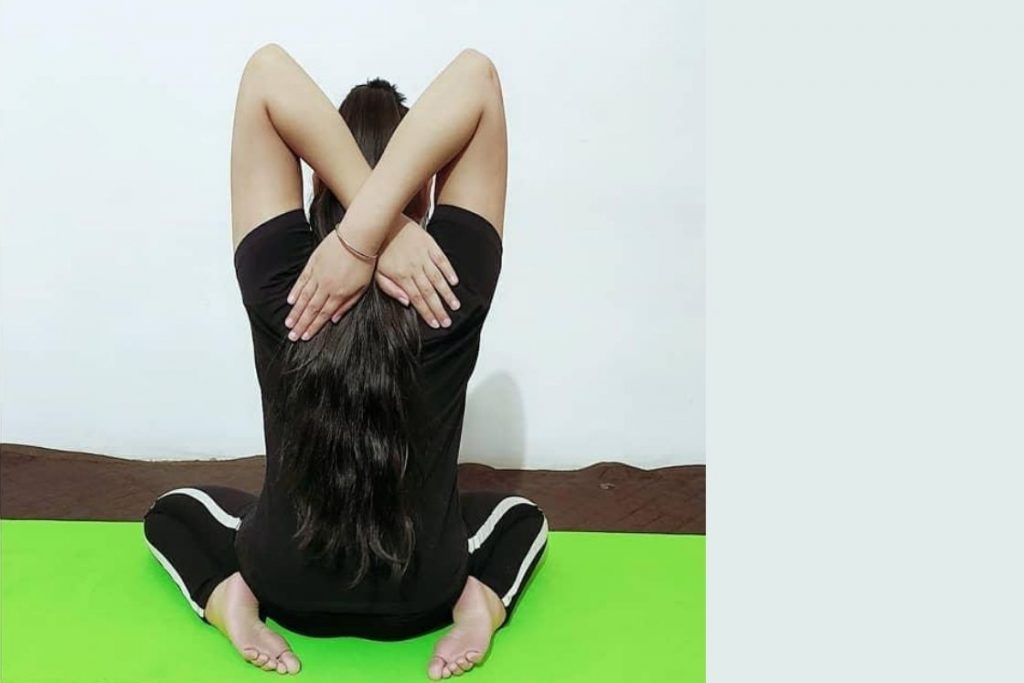
On this variation, in distinction to fundamental Mandukasana pose the trunk stays upward & straight. Then arms take again and crossed one another at wrists. It’s known as Uttana Mandukasana.
- Start with Vajrasana after that unfold your knees aside, let your huge toes contact one another behind the buttocks.
- Are available in Jalandhar bandha – Chin to the chest lock. One can go for Urdhva (to Gaze upward or ceiling facet) and Bhrumadhya Drishti for this asana.
- Elevate your each arms up and cross them whereas taking them behind the shoulder and contact the upward place of your shoulder blades.
Precautions & contraindications
- Don’t practise Mandukasana you probably have peptic ulcers or duodenal ulcers.
- Keep away from this pose after current belly surgical procedure.
- Don’t carry out the pose you probably have a decrease again or spinal damage.
- Keep away from the pose in case of knee ache, knee damage or ankle discomfort.
- Don’t practise throughout diarrhoea or extreme abdomen ache.
- Pregnant girls ought to take steerage from a professional yoga trainer or physician earlier than practising.
- Practitioners with power digestive points ought to enter the pose slowly and cease if any ache seems.
- Keep away from the pose in case you really feel dizziness, breath discomfort or strain within the decrease stomach whereas bending.
Medical Disclaimer: This pose presents a number of conventional advantages, however it mustn’t change medical remedy. Folks with ongoing well being circumstances ought to seek the advice of a physician or licensed yoga therapist earlier than practising, particularly in the event that they really feel ache or discomfort.
Mandukasana advantages
Mandukasana helps enhance digestion, stimulates the pancreas and opens the hips and thighs. It additionally calms the thoughts and helps higher metabolism, making it a helpful pose for each bodily and psychological wellbeing. As a result of the pose applies light strain to the belly space and stretches the decrease physique, it’s broadly utilized in yoga remedy to help digestive well being, stress aid, and joint mobility.
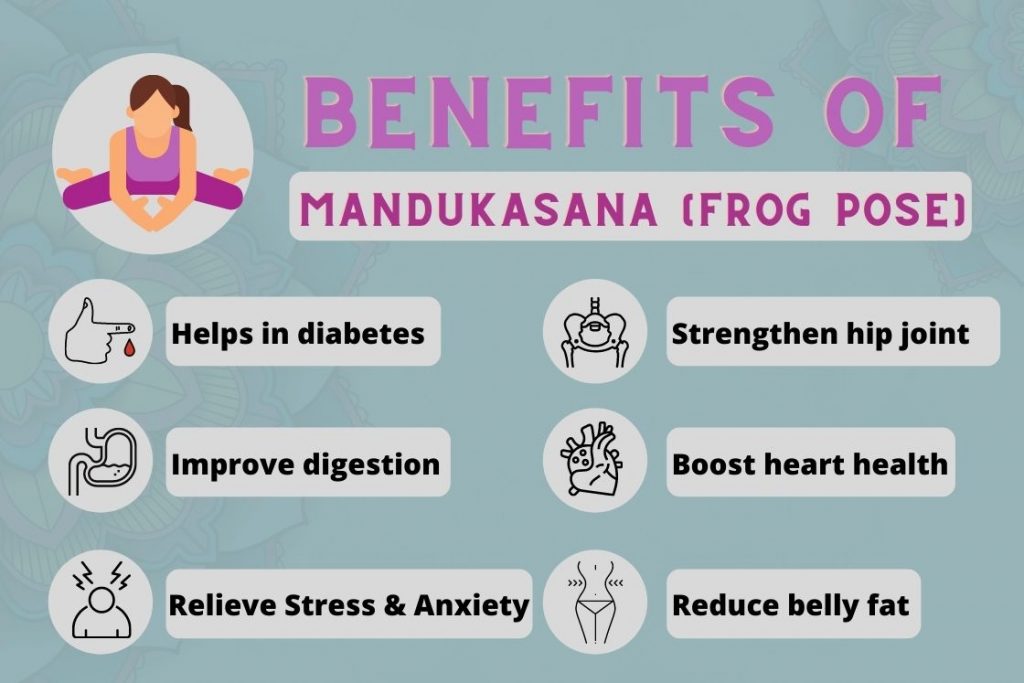
- Improves digestion: Mandukasana locations light strain on the abdomen and intestines, which helps therapeutic massage the belly organs. This improves digestion, reduces gasoline and bloating, and helps more healthy bowel motion. It’s usually really useful in yoga remedy for weak digestion.
- Stimulates the pancreas: The ahead bend presses the world across the pancreas, which can assist help higher insulin secretion. This makes the pose useful for individuals managing blood sugar ranges below correct medical steerage. It is likely one of the key yoga poses used for pancreatic stimulation.
- Reduces stress and calms the thoughts: The ahead folding place will increase blood stream to the pinnacle and creates a cooling, grounding impact. This helps launch psychological rigidity and helps leisure. Practising it usually can enhance focus and scale back stress.
- Helps weight administration: The pose prompts the belly space and improves metabolism. Over time, this will likely assist scale back additional fats across the waist and stomach. It’s usually included in yoga routines for core well being.
- Improves flexibility of hips and thighs: Mandukasana stretches the interior thighs, hips and decrease again. This helps scale back stiffness and improves joint mobility. It’s particularly helpful for individuals with tight hips from lengthy sitting hours
- Strengthens knees and ankles: The seated place in Vajrasana helps enhance blood stream across the knee and ankle joints. With common follow, these joints grow to be stronger and extra steady. It’s useful for individuals with gentle stiffness.
- Enhances lung perform (Uttana Mandukasana): The upright variation opens the chest and improves rib cage growth. This helps deeper respiration and higher lung perform. It’s useful for individuals with shallow respiration patterns.
- Opens the pelvic area (Adho Mukha Mandukasana): The downward dealing with frog variation offers a deep stretch to the hips and pelvic muscle mass. This will increase pelvic mobility and helps launch rigidity saved within the decrease again and groin areas. It’s usually utilized in yoga remedy for hip opening.
Conclusion
Mandukasana is a straightforward but efficient yoga pose that helps digestion, strengthens the decrease physique and calms the thoughts. Its ahead bending motion helps draw consciousness inward, whereas its light strain on the stomach improves the well being of the digestive organs. The pose is simple to be taught, appropriate for newcomers and presents vital advantages via its variations as properly. With common follow and correct steerage, Mandukasana can grow to be a gentle a part of a yoga routine that helps general wellbeing.
FAQs on mandukasana
1. Can Mandukasana scale back stomach fats?
Mandukasana helps activate the belly muscle mass and enhance metabolism, which can help fats loss across the waist. It’s simplest when paired with common follow and a wholesome way of life.
2. Is Mandukasana secure for individuals with diabetes?
Sure, it’s generally really useful as a result of it stimulates the pancreas and will assist help higher insulin perform. Nevertheless, individuals with diabetes ought to practise below steerage and keep away from robust strain in the event that they really feel discomfort.
3. How lengthy ought to I maintain Mandukasana?
Most practitioners maintain the pose for twenty to sixty seconds relying on consolation. Learners can begin with shorter holds and improve the period steadily.
4. Can Mandukasana assist with constipation?
Sure, the pose massages the belly organs and improves bowel motion. Common follow may also help relieve gentle constipation and help a more healthy digestive system.
5. What’s the greatest time to practise Mandukasana?
One of the best time is early morning on an empty abdomen or at the very least 4 hours after a meal. This enables the belly strain to work successfully with out discomfort.
6. Is Mandukasana good for newcomers?
Sure, Mandukasana is beginner-friendly because it has easy steps and doesn’t require superior flexibility. Learners ought to transfer slowly, keep away from breath retention and use help in the event that they really feel pressure within the knees or decrease again.
